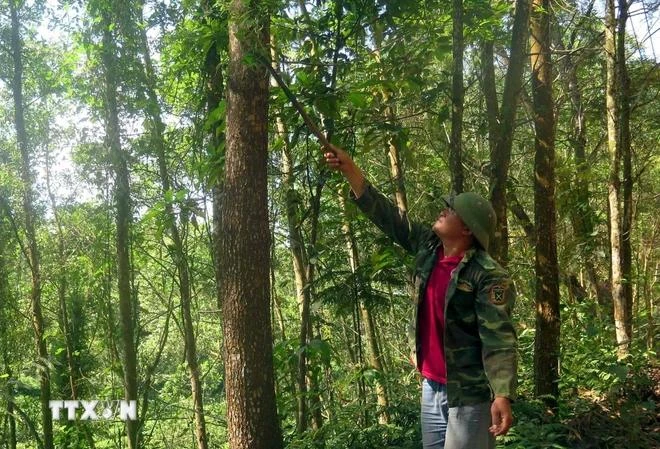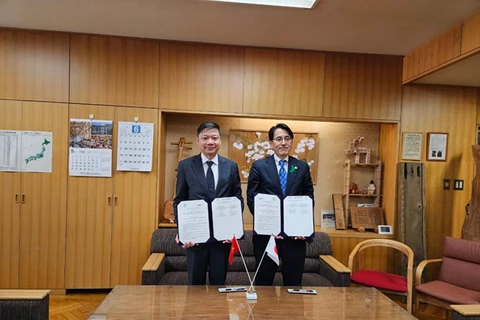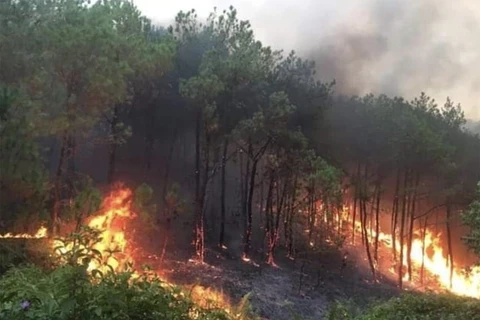
Hanoi (VNA) - The Ministry of Agriculture and Rural Development (MARD) has set a target of reaching a stable national forest cover rate of 42-43%, focusing on improving forest quality by 2030.
The goals were outlined in the MARD's recently announced National Forestry Planning scheme through 2030, which also sets a goal of helping the export value of wood and forestry products reach 25 billion USD by 2030.
Minister of Agriculture and Rural Development Le Minh Hoan said the forestry planning scheme is one of four major plans within the agricultural sector.
Its main focus is not on the allocation of areas or types of forests, but rather on governance to attract investment in forestry and promoting the reputation of forested areas to help investors see each locality's potential and join in its development. The plans serve as a catalyst for attracting investors.
The minister urged provinces and cities to review the forestry planning and integrate it into their localities' own socio-economic development plans.
The planning scheme aims to protect wild spaces, including forested land and non-forested land designated for forest development, and forestry infrastructure projects such as nursery systems, forest product transportation roads and facilities serving forest protection like guard stations, lookout towers and firebreaks.
The overarching goal is to build the forestry sector into an economic and technical industry based on the establishment, management, protection, development and sustainable use of forest resources and forestry land. This would help ensure widespread participation of organisations and individuals in forestry activities, mobilising social resources and maximising the potential and value of forests for sustainable development.
Ultimately, the plan will help contribute to socio-economic development, environmental protection, conservation of natural resources, increasing biodiversity and responding to climate change.
Specific targets include maintaining a stable national forest cover rate of 42-43%, focusing on enhancing forest quality, particularly for existing natural forests, and growing forestry production value by an average of around 5% annually.
Under the plan, the export value for wood and forestry products is expected to hit 20 billion USD by 2025 and 25 billion USD by 2030.
By 2025, income from planted production forests per unit area will increase by a factor of 1.5. This figure is expected to double by 2030 compared to 2020 levels.
Revenue from forest environmental services is projected to grow by an average of 5% per year to a value of around 3.5 trillion VND (141 million USD) annually by next year and around 4 trillion VND (161 million USD) annually from 2026 to 2030.
The planning outlines seven groups of solutions and nine areas where the state prioritises investment support.
These include the transfer of new and advanced technologies in forestry production; creating sustainable forest management plans and issuing production forest certificates; the establishment of forestry infrastructure systems for planted production forests; the production of high-quality forest tree seedlings; creating models of cooperation in forest protection and development in particularly difficult areas; the implementation forest protection and regeneration activities with additional planting for natural production forests in mountainous, border or island areas, and especially difficult regions; support for community development to enhance livelihoods and improve the lives of people living in buffer zones of special-use forests; training and development of a forestry-related workforce; and investment promotion and market development.
Speaking at the announcement ceremony, Director of the Forestry Department Tran Quang Bao confirmed that the National Forestry Planning would contribute to the implementation of the Law on Planning, the Law on Forestry and the realisation of the Vietnam Forestry Development Strategy for the period of 2021-2030 as approved by the Prime Minister, while also contributing to the successful achievement of the sustainable development goals outlined in the Resolution of the 13th National Party Congress./.






















